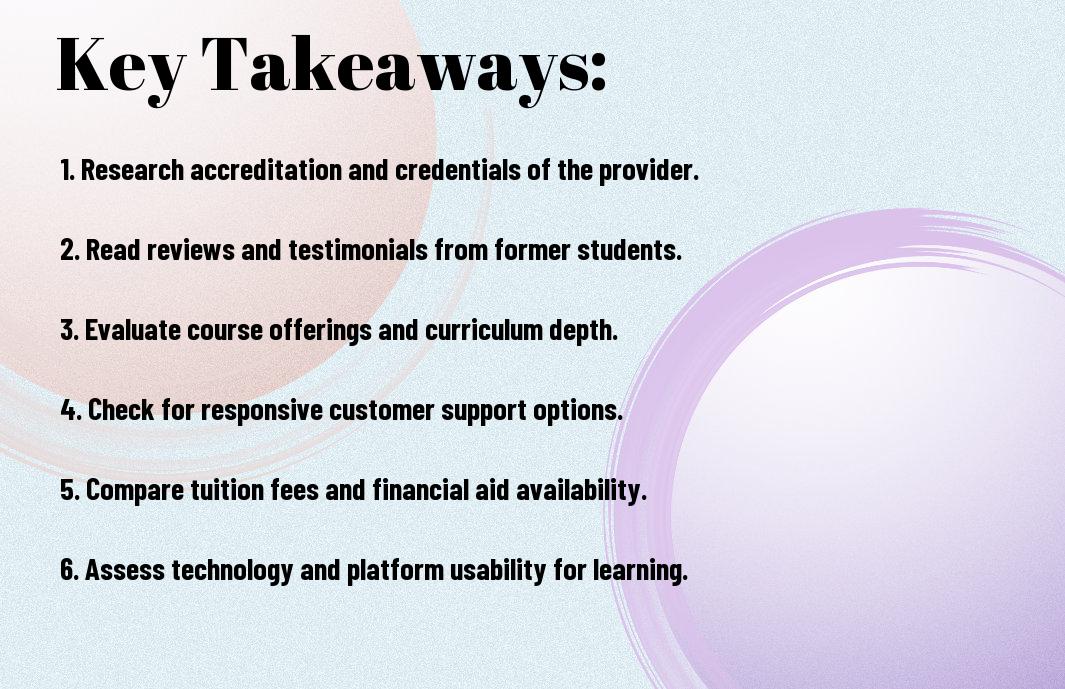As you navigate the vast landscape of online education, you’re faced with a daunting task: selecting a provider that meets your needs. Your goal is to find a reputable institution that offers quality courses, flexible learning options, and reliable support. You want to make an informed decision, one that will yield a valuable learning experience. In this guide, you will learn how to evaluate online education providers and make a choice that aligns with your academic and professional aspirations.

Key Takeaways:
When identifying a reliable online education provider, there are several factors to consider. Here are the main points to focus on:
- Look for Accreditation from recognized accrediting agencies to ensure the provider meets Quality standards.
- Check the provider’s Reputation by reading Reviews from current and former students to get an idea of their Support services.
- Consider the Flexibility of the online courses, including Scheduling and Pacing, to fit your Lifestyle and Learning style.
- Evaluate the provider’s Resources, such as Technological infrastructure, Library access, and Career services, to support your Academic success.
- Assess the Cost and Funding options, including Scholarships and Financial aid, to ensure the program is Affordable and aligns with your Budget.
Identifying Key Characteristics
The search for a reliable online education provider begins with understanding what makes an institution trustworthy. You will need to consider several factors, including reputation, curriculum, and accreditation, to ensure that your educational needs are met.
Reputation and Accreditation
Opposite to what you might expect, a reputable online education provider is not solely defined by its popularity, but rather by its accreditation and the quality of its programs. You should verify that the institution is accredited by a recognized accrediting agency to ensure your degree holds value.
Curriculum and Course Offerings
Beneath the surface of any online education provider lies a set of curriculum and course offerings that can make or break your learning experience. You should look for institutions that offer a diverse range of courses and specializations that align with your career goals and interests.
But as you examine deeper into the curriculum and course offerings, you will find that a good online education provider should also offer flexibility and support. You should be able to access course materials, interact with instructors, and receive feedback in a way that suits your learning style and schedule, allowing you to make the most of your educational investment.

Evaluating Online Platforms
Any online education provider you consider should offer a platform that is easy to navigate and use. You will want to assess the overall quality of the platform, including its design, functionality, and accessibility.
User Experience and Interface
Before committing to a provider, you should explore their platform to see how it feels to use. You can test the interface, looking for a logical layout and clear instructions that make it simple for you to find what you need.
Technical Support and Resources
Behind every good online platform is a team of people who can help you when you encounter problems. You should look for a provider that offers reliable technical support, with resources such as FAQs, tutorials, and contact information for assistance.
Further investigation into the technical support and resources offered by a provider can give you a sense of their commitment to your success. You can look for reviews or testimonials from other users to see how well the provider responds to technical issues and whether they offer adequate support for your needs.
Assessing Faculty and Instruction
Now that you’re evaluating online education providers, it’s vital to scrutinize their faculty and instructional methods to ensure they meet your standards.
Qualifications and Expertise
Alongside your research, you’ll want to examine the qualifications and expertise of the instructors, as this will impact the quality of your education, and you should verify their credentials to ensure they have the necessary experience in their field.
Teaching Methods and Engagement
With a keen eye, you’ll assess the teaching methods employed by the provider, considering how they foster engagement and interaction, which is vital for your learning experience, and you should look for methods that encourage participation and feedback.
And as you examine deeper into the teaching methods, you’ll want to consider how they cater to different learning styles, allowing you to absorb and process information effectively, and you should evaluate how the provider facilitates collaboration and discussion among students, which can significantly enhance your overall learning experience.
Considering Student Support Services
Despite the numerous online education providers available, you should prioritize those that offer comprehensive support services, as this will significantly impact your learning experience. You need to feel supported throughout your educational journey, and having access to reliable services can make a substantial difference.
Academic Advising and Mentorship
Guiding you through your academic path, a reliable online education provider will offer expert advice and mentorship, helping you to make informed decisions about your course and career goals. You will have a dedicated advisor to turn to when you need guidance.
Career Guidance and Placement
By examining the career guidance and placement services offered by an online education provider, you can determine whether they will support you in achieving your professional objectives. You should look for providers that have a strong track record of placing graduates in relevant jobs.
Also, consider the type of career resources and tools that the provider offers, such as resume building, interview preparation, and job search assistance. You want to choose a provider that will not only educate you but also help you launch your career, providing you with the skills and knowledge to succeed in your chosen field.
Reviewing Reviews and Testimonials
Many online education providers showcase glowing testimonials on their websites, but you must dig deeper to get a true sense of their reliability. You should look beyond the marketing material and seek out independent reviews from trusted sources to get a well-rounded view of the provider’s strengths and weaknesses.
Student Feedback and Ratings
Around the web, you can find forums and review platforms where current and former students share their experiences with online education providers. You can use these resources to gauge the overall satisfaction of students with the provider’s courses, instructors, and support services.
Alumni Success Stories and Endorsements
By examining the stories of successful alumni, you can gain insight into the effectiveness of the online education provider’s programs. You should look for detailed accounts of how the provider’s courses helped alumni achieve their goals and advance in their careers.
This information can be particularly valuable in helping you assess the provider’s ability to deliver on its promises and prepare students for success in their chosen fields. You can use this information to inform your decision and choose a provider that has a proven track record of helping students like you achieve their goals.
Comparing Pricing and Value
Once again, you’ll need to weigh your options carefully. For a comprehensive list, visit 11 Best Online Course Providers & Websites (2025). Consider the following:
| Pricing | Value |
|---|
Tuition and Fees
Any online education provider you choose will have varying tuition and fees, so you should calculate your costs carefully.
Financial Aid and Scholarships
About the financial aid options, you should inquire with your provider to see what’s available to you.
To get the most out of your investment, you should research and understand the types of financial aid and scholarships that your online education provider offers, and see if you qualify for them, to help fund your education and make the most of your budget.
Conclusion
From above, you have gathered the imperative factors to consider when selecting a reliable online education provider. You now have the tools to make an informed decision, ensuring your educational journey is both effective and enjoyable. By carefully evaluating your options, you can trust that your chosen provider will support your learning goals, and you will be well on your way to achieving academic success.
FAQ
Q: What are the key factors to consider when selecting a reliable online education provider?
A: When choosing a reliable online education provider, there are several key factors to consider. First, look for providers that are accredited by recognized accrediting agencies, as this ensures that the institution meets certain standards of quality. Additionally, consider the provider’s reputation, including their ratings and reviews from current and former students. It’s also important to evaluate the provider’s curriculum and course offerings to ensure they align with your educational goals. Furthermore, consider the level of support and resources provided, such as access to instructors, career counseling, and technical support. Finally, be sure to investigate the provider’s tuition and fees, as well as any financial aid or scholarships that may be available.
Q: How can I verify the quality of an online education provider’s courses and programs?
A: To verify the quality of an online education provider’s courses and programs, start by reviewing their curriculum and course descriptions to ensure they are comprehensive and up-to-date. Look for providers that have a clear and transparent approach to assessment and evaluation, and that offer opportunities for feedback and interaction with instructors. You can also check for any industry-recognized certifications or endorsements, such as those from professional organizations or accrediting agencies. Moreover, many online education providers offer free trials or demo courses, which can give you a sense of the quality of their instruction and the level of support provided. Finally, be sure to check the qualifications and experience of the instructors, as well as the provider’s track record of job placement and graduate outcomes.
Q: What kind of support and resources should I expect from a reliable online education provider?
A: A reliable online education provider should offer a range of support and resources to help you succeed in your studies. This may include access to dedicated instructors or teaching assistants, who can provide guidance and feedback on your coursework. Additionally, look for providers that offer technical support, such as help with software or hardware issues, as well as resources for academic support, such as tutoring or study groups. Many providers also offer career counseling and job placement services, which can help you transition into the workforce after completing your program. Furthermore, consider providers that offer flexible payment plans, financial aid, or scholarships to help make their programs more accessible and affordable. Finally, be sure to evaluate the provider’s communication channels, including their response time to inquiries and their availability for support via phone, email, or live chat.

